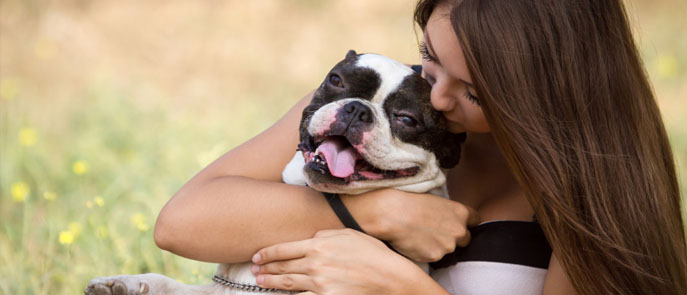
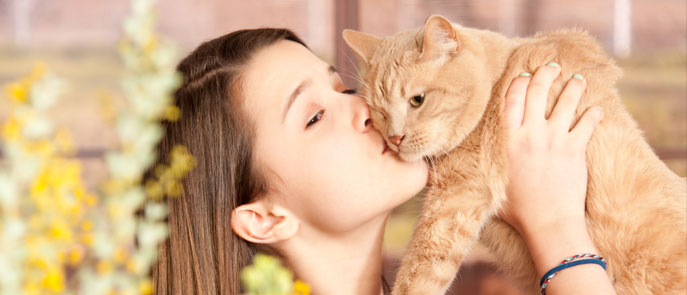
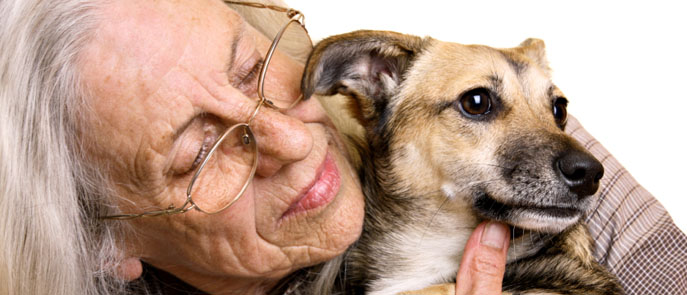
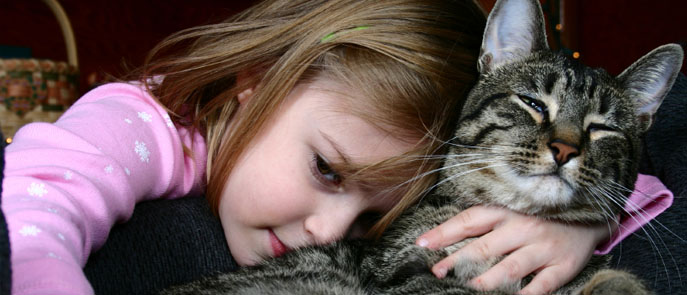
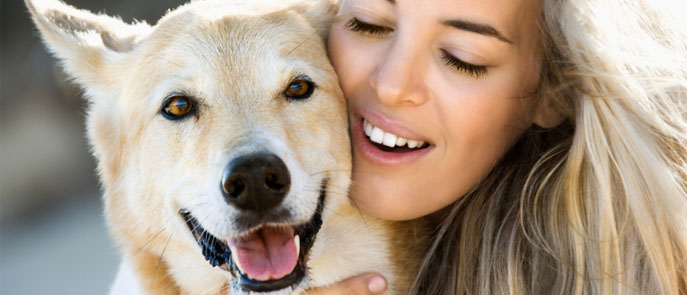
 |
Loss Of A PetGrieving The Loss Of A PetGrief is the normal response to any important loss in life. It occurs regardless of whether death followed a prolonged illness, or a sudden accident. Grieving people experience both physical and emotional traumas as they try to adapt to the upheaval in their lives brought about by the loss. Psychologists have long recognized that the grief suffered by pet owners after their pet dies is the same as that experienced after the death of a person. The death of a pet means the loss of a non-judgmental love source. There is no longer anything for the pet owner to nurture and care for. Furthermore, the owner looses his or her contact with "the natural world". These feelings can be particularly intense for the elderly, single people and childless couples,( for whom the pet also is a child substitute). The Stages Of GriefIn truth, the process of grief is not a cut and dried process that can be subdivided into strict categories. Rather, the grief process is a continuum, with each person experiencing it in a different way. Dividing the grief process in to "stages" helps the grief stricken person to understand that their experiences and emotions are normal. Some people will quickly progress through all the phases, while others appear to get "stuck" in a particular phase. Briefly, the stages of grief are as follows:
1. SHOCK AND DENIAL
The reality of death has not yet been accepted by the bereaved. He or she feels stunned and bewildered-as if everything is "unreal". 2. ANGER The grief stricken person often lashes out at family, friends, themselves, God, the Veterinarian or the world in general. Bereaved people will also experience feelings of guilt or fear during this stage. 3. BARGAINING In this stage, the bereaved asks for a deal or reward from either God, the Veterinarian or the Clergy. Comments like "I'll go to Church every day, if only my pet will come back to me" are common. 4. DEPRESSION Depression occurs as a reaction to the changed way of life created by the loss. The bereaved person feels intensely sad, hopeless, drained and helpless. The pet is missed and thought about constantly. 5. ACCEPTANCE Acceptance comes when the changes brought upon the person by the loss are stabilized into a new lifestyle. The depth and intensity of the mourning process depends on many factors. The age of the owner, circumstances surrounding the death, relationship of the animal to the owner and to other family members, are all significant. Recently experiencing the death of a significant person in the owner's life can also affect how the pet's death is handled. Usually, children recover more quickly, while the elderly take the longest. Sometimes, the death of a pet will finally enable the bereaved to mourn the loss of a person, whose death had not yet been accepted. Pet Loss and ChildrenMany people do not realize how traumatic and confusing death can be on a child. Although children tend to grieve for shorter periods of time, their grief is no less intense than that experienced by adults. Children also tend to come back to the subject repeatedly; so extreme patience is required when dealing with the grieving child. Some helpful tips for helping the grieving child include:
1. Giving the child permission to work through their grief.
2. NEVER say things like "God took your pet", or the pet was "put to sleep".
3. Include the child in everything that is going on. 4. Explain the permanency of death. Do Pets Grieve?What many people find hard to believe is that animals can form very firm attachments with each other. Even pets that outwardly seem to barely get along will exhibit intense stress reactions when separated. In fact, grieving pets can show many symptoms identical to those experienced by the bereaved pet owner. The surviving pet(s) may become restless, anxious and depressed. There may also be much sighing, along with sleep and eating disturbances. Often, grieving pets will search for their dead companions and crave more attention from their owners.
How can an owner help the grieving pet?
By following the following recommendations: 1. Keep the surviving pet(s) routines as normal as possible. 2. Try not to unintentionally reinforce the behavior changes.
There is no evidence that doing so will help the surviving pet(s), but some people claim that it does. Usually, all it accomplishes is to make the owner feel better. Therefore, if the owner wants to have the surviving pets "say good-bye", then it should be allowed. HealingGiven time, healing will occur for the bereaved owner. However, there are several things that the grief-stricken owner can do to help speed up the healing process:
1. Give yourself permission to grieve.
4. Surround yourself with people who understand your loss.
8. Be patient with yourself.
ConclusionGrief is probably the most confusing, frustrating and emotional thing that a person can experience. It is even more so for pet owners. Society in general does not give bereaved pet owners "permission" to grieve openly. Consequently, pet owners often feel isolated and alone. Luckily, more and more resources are becoming available to help the bereaved pet owner realize that they are NOT alone and that what they are feeling is entirely normal. Source: Grief and Pet Loss by Margaret Muns EuthanasiaThe decision to have your pet euthanaised is a serious one and it is difficult to make. Your relationship with your pet is special. You are responsible for their care and welfare ensuring they have a good quality of life. Euthanasia may be necessary if your pet:
Your veterinarian understands attachment to pets. They can evaluate your pet's condition, estimate your pet's chances for recovery, discuss potential disabilities, long-term problems and possible options. Review the facts, ask for further information if there is something you are unsure of or do not understand and discuss your options with friends or family. Family members should be able to express their thoughts and feelings even if you have reached a decision. Children have special relationships with pets and if given straightforward, truthful, simple answers they will accept a pet's passing as part of life's normal cycle.
What is euthanasia?
Euthanasia is accomplished by an injection of a very strong anaesthetic drug. It causes the pet to immediately go into a quiet and irreversible deep unconsciousness followed quickly by the heart and brain stopping resulting in a painless passing.
What happens after euthanasia?
You may want to discuss the care of the remains of your pet's body with your family and veterinarian. If you are too upset your vet can make arrangements with us on your behalf.
How to say goodbye?
Your pet is an important part of your life, it is natural to feel you are losing a friend. Although farewells are difficult the act of saying goodbye is an important step in managing the natural & healthy feelings of grief, sorrow and sense of loss. Establishing a memorial of some type in honour of your pet (eg: a special candle, a tree, a plaque) may also help.
Should you get another pet?
Losing a pet is emotionally upsetting and you may feel you never want another pet. Although you can never replace the pet lost, you can learn to love and share your life with another pet without loving the departed one any less. The decision of when, if ever, to bring a new pet into your life is a personal one. Family members should come to an agreement on when the timing is appropriate for everyone. The NSW Animal Welfare League has pets needing loving homes. You can contact them on (02) 9606 9333 (animal adoption). The period from birth to old age is much more brief in pets than in people. Death is part of the life cycle for all creatures, it cannot be avoided but it can be met with understanding and compassion. Pet Grief Counselling ServicesPhone Services:
Websites: Counsellors;
|
